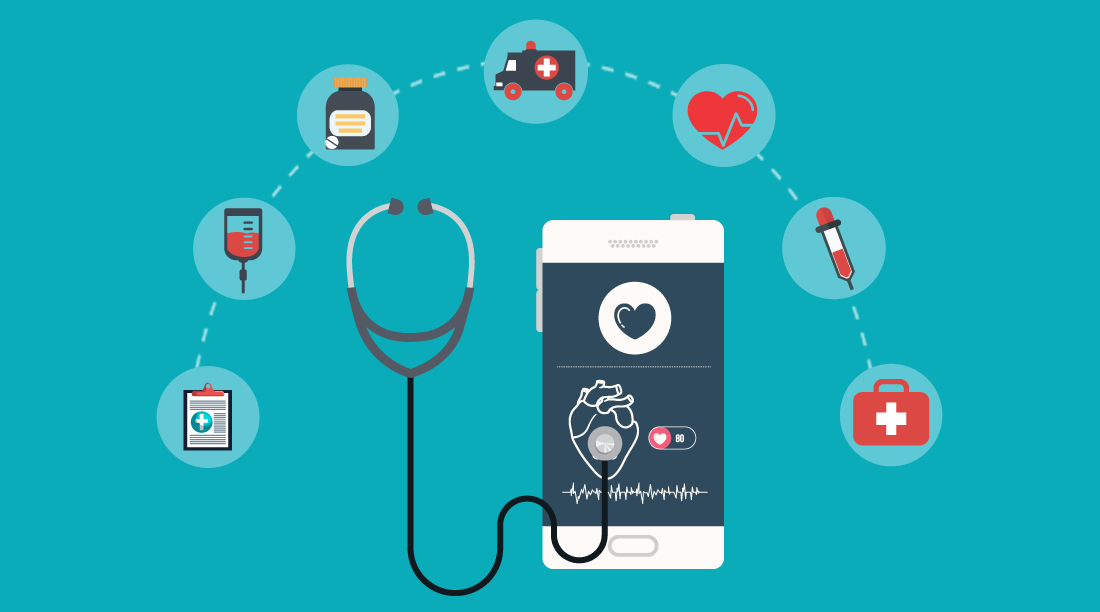In the contemporary landscape of the 21st century, healthcare is undergoing a paradigm shift, transcending traditional boundaries of hospitals and clinics. The surge in healthcare software solutions is orchestrating a revolution in our approach to well-being, disease management, and medical interactions. These apps serve as conduits, aiding patients in accessing medical necessities while enabling medical professionals to deliver services devoid of physical constraints.
Defining Healthcare Apps: The advent of COVID-19 propelled healthcare mobile app development into the spotlight. As health and fitness assumed paramount importance, the demand for such apps witnessed an unprecedented surge. These healthcare apps encompass a wide spectrum, ranging from wellness and fitness applications to those facilitating telemedicine and chronic disease management. Leveraging technology, these apps bring healthcare services within the grasp of users’ fingertips.
Types of Healthcare Apps in the Market: In a saturated mobile app development market, diverse offerings cater to medical professionals, educators, and patients alike. Tailored to specific use cases, healthcare apps can be categorized as follows:
Designed for Healthcare Providers:
- Healthcare Database and Reference:
- Enables medical experts to store information on diseases, drugs, and medical conditions.
- Facilitates staying abreast of the latest medical information and trends.
- Appointment Apps:
- Streamlines appointment management for doctors, eliminating the need for handwritten journals.
- Facilitates appointment approvals and patient reminders.
- Patient Monitoring:
- Empowers doctors to track patients’ medical conditions remotely.
- Stores patient case files and facilitates communication.
- Social Network:
- Functions as a professional networking platform for medical experts.
- Connects doctors, health practitioners, and facilitates health discussions.
Designed for Patients:
- Educational Apps:
- Disseminates information about various health conditions.
- Provides valuable health tips.
- Reminder Apps:
- Sends reminders for medication, appointments, and promotes a healthy lifestyle.
- Monitors patient health around the clock.
- Diagnosis:
- Assists patients in understanding symptoms and contacting medical experts promptly.
- Nutrition:
- Aids in tracking eating habits and promotes a healthy lifestyle.
- Health Monitoring:
- Allows patients with chronic illnesses to monitor their conditions.
- Alerts both the patient and medical professional in severe situations.
- Telemedicine:
- Facilitates remote consultations between patients and healthcare providers.
- Mental Health:
- Offers meditation, stress relief, and self-care tools.
- Addresses the growing work-life imbalance.
Technologies Transforming Healthcare Mobile App Development
The success narrative of healthcare apps has spurred increased investment, both monetarily and technologically. Healthcare mobile app development is witnessing a significant surge, with emerging trends shaping the landscape. Key technologies transforming the field include:
- Artificial Intelligence (AI):
- Empowers predictive analytics, diagnostic support, and personalized healthcare plans.
- Drives engaging chatbots for real-time assistance.
- Internet of Things (IoT):
- Incorporates smart wearables and sensors for remote patient monitoring and data collection.
- Enables informed decision-making for healthcare professionals.
- Blockchain Technology:
- Ensures the integrity and security of healthcare data.
- Facilitates secure sharing of medical records with transparent and traceable transactions.
Essential Steps in Healthcare Mobile App Development
Developing a healthcare mobile app demands meticulous planning, adherence to industry regulations, and a user-centric approach. Seven crucial steps ensure a successful development process:
- Define the Purpose and Scope:
- Conduct extensive research to identify specific healthcare needs.
- Determine goals, whether focused on patient engagement, remote monitoring, or medication management.
- Compliance with Healthcare Regulations:
- Familiarize yourself with healthcare regulations, especially data privacy and security.
- Implement robust security measures, including encryption and secure authentication.
- Designing User-Centric Interface:
- Prioritize empathetic design considering emotional and physical aspects of healthcare.
- Ensure accessibility for a diverse user group.
- Development and Integration:
- Create a prototype for visualization and gather initial feedback.
- Prioritize interoperability for efficient data exchange.
- Testing and Quality Assurance:
- Conduct thorough testing under different scenarios.
- Collect user feedback and iterate based on insights gained.
- Deployment and Monitoring:
- Release the app in phases for controlled deployment.
- Implement monitoring tools to track performance, user engagement, and security.
- Adherence to Ongoing Trends and Regulations:
- Stay abreast of emerging trends like AI integration and blockchain for data security.
- Regularly check for updates to healthcare regulations and ensure compliance.
Challenges Faced by Healthcare App Developers
Despite the positive impact on users’ lives and market growth, healthcare app developers encounter specific challenges:
- Navigating Regulatory Compliance:
- Navigating complex regulatory landscapes, including compliance with HIPAA and data protection regulations.
- Integration with Legacy Systems:
- Overcoming technical challenges in integrating apps with existing legacy systems for seamless interoperability.
- User Trust and Adoption:
- Building and maintaining user trust through transparent communication about data security practices.
Concluding Note
As healthcare mobile app development unfolds, it emerges as a guiding force shaping the future of healthcare. Tomorrow’s healthcare will be defined by personalized, accessible, and data-driven solutions. The current juncture presents an opportune moment to invest in the development of efficient, user-friendly, and secure medical apps.


“Grateful to have found the best urologist in Rawalpindi! is truly a gem in the medical field, providing top-notch expertise and compassionate care. If you’re seeking a knowledgeable and trustworthy urologist in urologist rawalpindi , look no further. Highly recommend! #Urologist #RawalpindiHealthcare #ExpertCare”